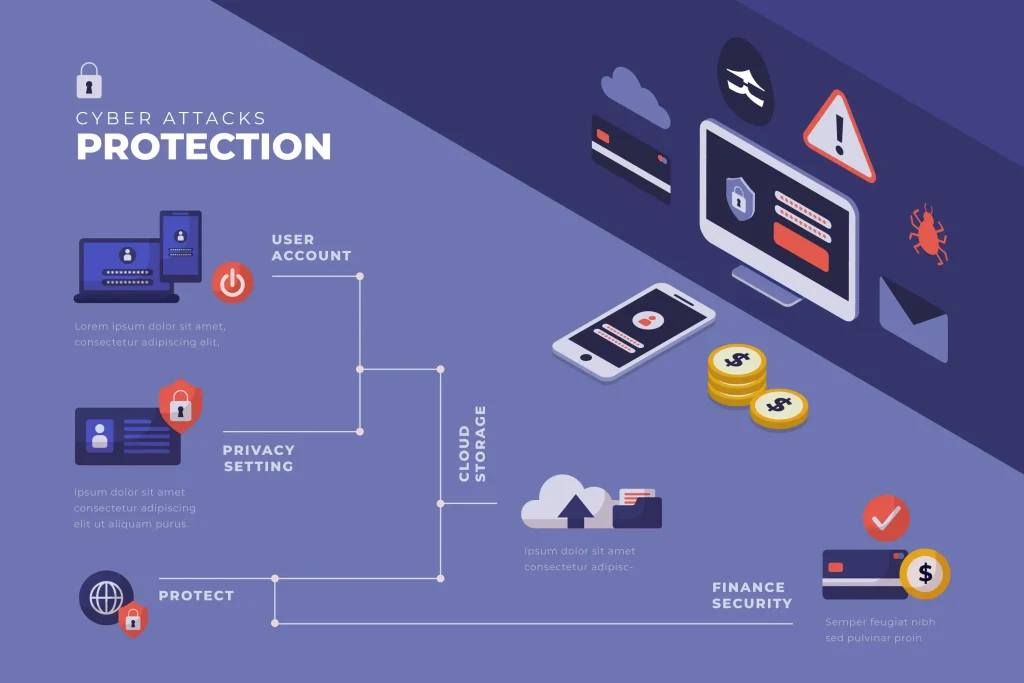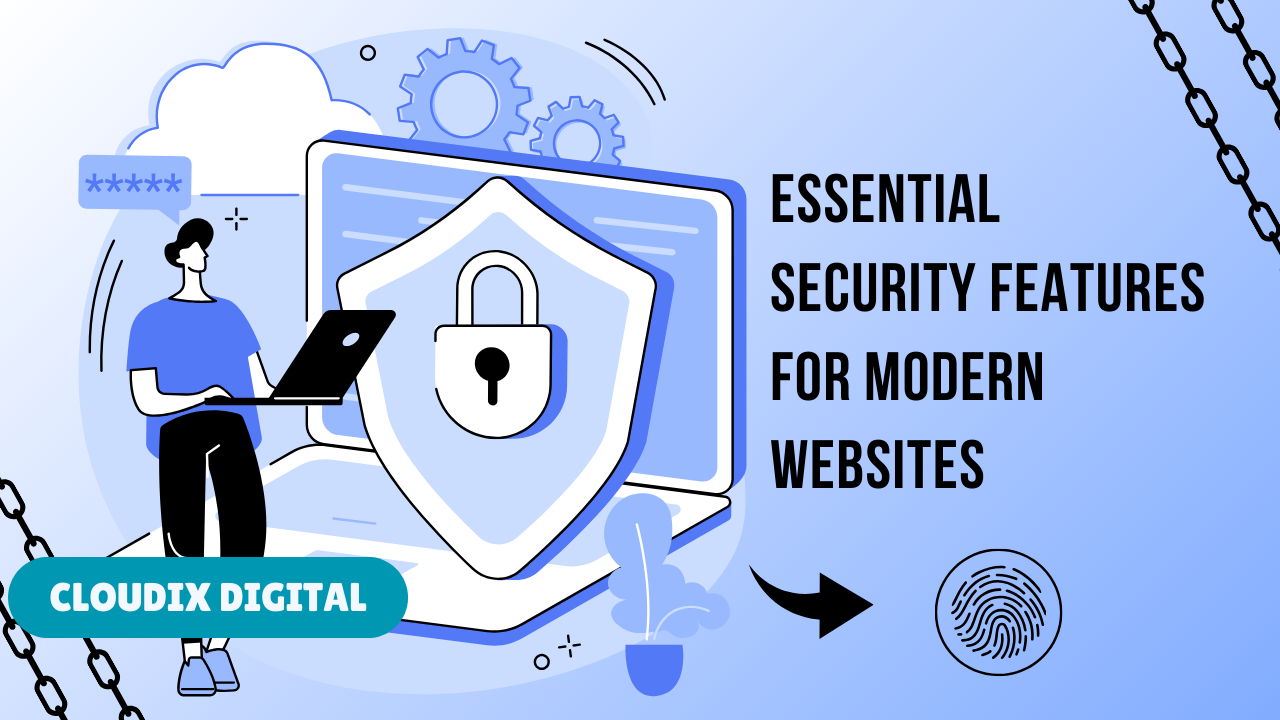In today’s digital landscape, website security has never been more crucial. Cyberattacks are becoming increasingly sophisticated, and websites are prime targets for hackers looking to exploit vulnerabilities. Whether you run a personal blog, an e-commerce platform, or a business website, safeguarding your online presence is essential for protecting both your users and your data. At Cloudix Digital, we understand the importance of a secure website and have compiled this guide on the essential security features every modern website should have.

1. SSL Certificates (HTTPS)
The first line of defense in securing your website is the SSL (Secure Sockets Layer) certificate. When installed, an SSL certificate ensures that any data transferred between the server and the user’s browser is encrypted. This helps protect sensitive information, such as login credentials, payment details, and personal data, from being intercepted by hackers. Websites with SSL certificates use the “https://” prefix, signaling to users that the site is secure.
Why it’s important: Not only does SSL encryption protect user data, but search engines like Google also give preference to secure websites, improving your SEO ranking.
2. Regular Software and Plugin Updates
Outdated software and plugins are among the most common vulnerabilities on websites. Cybercriminals often exploit weaknesses in old versions of content management systems (CMS), plugins, and themes to gain unauthorized access to your site. Regularly updating your software, plugins, and themes ensures that known security vulnerabilities are patched promptly.
Why it’s important: Keeping your site up-to-date helps close security gaps, reducing the chances of a successful attack.
3. Two-Factor Authentication (2FA)
Two-factor authentication (2FA) adds an extra layer of protection to your website login process. Even if a hacker gains access to your username and password, they will not be able to log in without the second authentication factor (such as a temporary code sent to your phone or email).
Why it’s important: 2FA significantly reduces the likelihood of unauthorized access to your website’s backend, providing enhanced security for your admin accounts.

4. Firewalls and Web Application Firewalls (WAFs)
A firewall acts as a barrier between your website and the outside world, filtering traffic to block malicious requests. A Web Application Firewall (WAF) specifically protects your site from threats such as SQL injection, cross-site scripting (XSS), and other common cyberattacks.
Why it’s important: A firewall prevents unwanted traffic from reaching your website, reducing the risk of data breaches and other security issues.
5. Backup Solutions
Regular backups are crucial in ensuring that, in the event of a cyberattack or data loss, you can restore your website to its previous state. Automated backups allow you to restore files, databases, and configurations without significant downtime or loss of information.
Why it’s important: If your website is compromised, a recent backup ensures that you can quickly recover without losing valuable data or facing extended downtime.
6. Secure Password Management
Weak or reused passwords are one of the easiest ways for hackers to gain access to your website. Using complex passwords, combined with a password manager, is essential to maintain security. For added security, ensure that users on your site (such as admins or contributors) follow best password practices.
Why it’s important: Strong passwords are the first defense against unauthorized access, helping prevent brute-force attacks and credential stuffing.
7. Malware Scanning and Removal
Malware can be hidden within your website files, often going unnoticed until it’s too late. Implementing regular malware scanning tools can help identify and remove threats before they cause significant damage. These tools scan for viruses, Trojans, and other harmful code that may compromise your website’s integrity.
Why it’s important: Early detection and removal of malware help keep your site running smoothly and protect it from being blacklisted by search engines or flagged by security organizations.
8. Content Security Policy (CSP)
A Content Security Policy (CSP) is a security feature that helps prevent certain types of attacks, such as Cross-Site Scripting (XSS) and data injection attacks, by controlling the sources of content that can be loaded on your website. By defining a strict set of rules about which domains can serve content on your site, you reduce the risk of malicious code being executed.
Why it’s important: A properly implemented CSP can prevent unauthorized code execution, helping to safeguard your website from vulnerabilities that hackers may exploit.
9. Regular Security Audits
Performing regular security audits helps ensure that your website is continuously monitored for potential threats. These audits check for vulnerabilities, outdated software, misconfigurations, and other areas where security could be improved. Regular audits also give you a clear overview of your site’s security posture, allowing you to take preventive measures before an attack occurs.
Why it’s important: Audits help identify risks that could otherwise go unnoticed, allowing you to take proactive measures to secure your site before problems arise.
10. User Permissions and Role Management
Limiting user access based on roles is a simple but effective way to prevent unauthorized users from making changes to critical parts of your website. For example, giving admin-level access only to trusted team members and restricting lower-level users from modifying key settings can reduce the risk of accidental or malicious changes.
Why it’s important: Proper role management ensures that only authorized individuals can make significant changes, helping to limit the damage caused by a potential breach.
Conclusion
Website security is a critical aspect of maintaining a strong online presence, and no website is too small to be a target. By implementing these essential security features—SSL certificates, regular updates, 2FA, firewalls, backups, and more—you can significantly reduce the risk of a security breach. At Cloudix Digital, we believe that a secure website is a successful website. If you need assistance in setting up or improving your website security, our expert team is ready to help you ensure your site is safe, secure, and always available.
Stay protected, and don’t wait for a breach to take action! For more tips on optimizing your website’s security, contact Cloudix Digital today.





